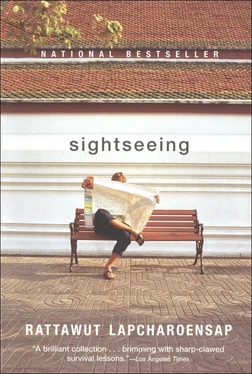“How old are you?” Ma asked suddenly.
“Excuse me?”
“How old are you?”
“I’m twenty-six, ma’am.”
“It’s a good age to be, twenty-six,” Ma said. “You might not think it from the way I look, but it wasn’t so long ago when I was your age. It wasn’t so long ago at all — though you’re far more beautiful than I ever was then.”
The girl just blinked at my mother’s flattery. The Chinese wife, for the first time, looked our way.
“Here’s the situation.” Ma put the hundred-baht note on the table with the other bills, patting the pile of money like a bettor blessing her ante. “I’ll tell you my problem and then you can decide whether or not to give me those glasses for seven-fifty today. Thing is, those glasses aren’t an accessory for me. They’re not an optional luxury. You see, I’m going blind. By this time tomorrow, I might not be able to see a thing. Do you understand what I’m saying? You’re looking at a woman who’s going blind. The doctors say those glasses might mean a few more days of sight for me — ask my son if you don’t believe me. Now, you don’t strike me as the type of girl who’d let a woman go blind over a few hundred bahts. But maybe you are. Maybe you’re that type of girl …”
“Oh come now, child, have a heart.”
It was the Chinese woman, her voice raspy like sandpaper.
Later that day, snaking our way through the aisles of the bazaar, Ma took the bag from my hands, put on the Armanis, and laughed a wild laugh of triumph, turning heads in the hot market.
I wake to the sounds of birds. The beggar has left his corner. Ma is already up, smoking a cigarette on the patio, warm wind rushing through the screen door, her small silhouette dark against the sky’s red and yellow hues. She’s wearing her sunglasses. When I approach, she flicks the cigarette over the railing.
She’s taken to smoking lately, something she’s never done before, a pack of Benson & Hedges a day. It’s one of many things that make my mother seem a stranger to me now. The sunglasses. The smoking. Ma and I, for the first time, taking a vacation together. The case of Tsingtao beer we’ve lugged down here with us from Bangkok. My mother drinking beer at all. She wears jeans and blouses and baggy T-shirts instead of neatly tailored business suits. She’s stopped wearing makeup as well, and — without the rouged cheeks, the crimson lips, the penciled eyebrows — I sometimes feel like I am seeing my mother’s face for the very first time. And I have woken up many times now to Ma sitting at a distance, watching me sleep.
“How long have you been up?” I ask groggily, sinking into the chair next to hers.
“A while. Just wanted to see the sunrise.”
“Feeling okay?”
“Fine,” she says. “It’s better this morning. No black dot yet.”
A few days ago, she told me that when her vision faltered, it was like looking through a kaleidoscope. A cold white flash flooded her eyes, and when her eyes refocused, it was like the world was breaking into a million tiny pieces. She had to shut her eyes for a while before the shattered world rearranged itself — before pieces of brown became a chair, pieces of red became a shirt, pieces of cream became her own reflection in the bathroom mirror. Sometimes, when she opened her eyes, the world would still be murky, blurred, like opening her eyes underwater, and it often took a while before things came back into focus again. These spells were getting longer and longer now, but she said she didn’t really mind them so long as they went away. What she did mind, however, was what she calls “the black dot”: a small black pinprick that begins in the center of her vision and expands in an ever-widening circle, like a dark flower whose blooming slowly smothers her sight. It grows larger and larger every day, and when this happens, Ma has to blink hard to keep the dot at bay.
We watch the sun rise together, the fiery orange slowly peeking over the sea, the first of the Andaman Islands a ghostly shadow on the horizon. Ma gets up from her chair. “I’m going to miss this,” she says.
The sea is a sheet of blue. We arrive at the port in Trang, buy our tickets to Koh Lukmak, sit down for a bowl of fish soup.
We have a long journey ahead of us — eight hours at sea. The stench of fish is in the air and, in the distance, ships bob on the horizon in a line, as if strung together by some invisible thread. Gulls swoop down upon docked junkers, pecking at fish guts left to waste on the plywood decks, squawking in their loud, discordant tones.
When we board, Ma promptly falls asleep, lying down across the narrow bench, a lifejacket as a pillow beneath her head, the sun a soft blue glow through the tarpaulin. The boat is long and thin, a sixteen-seater manned by a boy my age. He sits at the stern with the rod of the motor in hand, the blades behind him gurgling beneath the sea’s surface, the wind blowing through his reddish, sun-soaked hair. The sun climbs the sky. Waves gently slap against the boat’s wooden hull. A couple of farangs sit at the bow, outside of the tarpaulin shade, two white men in gaudy batik shirts passing a thin flask of Mekong whiskey between them. Koh Trawen — the island where we will drop off the farangs and stop for lunch before going on to Lukmak — is a faint hazy specter in the distance.
Before she fell asleep, Ma told me that during the 1930s and ’40s, Trawen was a penal colony, a place where the government sent con men, Royalists, dissident writers, and communists. After the war, the prisoners rebelled, murdering all of the authorities on the island. As retribution, the government cut off their rations and left the prisoners there to die, with no means of transport back to the mainland, surrounding the island with a naval patrol so the chaolay — the sea gypsies — could not come to their rescue. The government claimed they all died there after a few years, starved to death on the edge of the maritime border, but there are fishermen who swear that they still see fires in the hills at night, tiny orange flames flickering out across the open sea, the rebels — or perhaps their children; or perhaps their ghosts — waiting to return to the mainland, preparing for their next assault against the military government.
I watch Trawen’s faint outline on the horizon. One of the farangs lies down against the bow, his feet resting on the first bench, a cap pulled over his eyes. His friend stashes the whiskey flask into a backpack and smiles at me. I nod. Then he joins his friend on the bow, face up to the sky, draping a towel across his face. The tarpaulin beats overhead like a light sail. Soon, I am the only person awake except for the boy at the stern directing our small boat out into the Indian Ocean. I watch Ma sleeping for a while, watch the rise and fall of her chest. Every time she sleeps, I wonder if she will wake up blind, and I wonder what I’ll do then, what we’ll say to each other when the time comes. But soon I, too, start to feel drowsy, the small boat rocking like a cradle on the open sea.
When I wake up, Ma is hunched over, her head in her hands.
“Are you okay?” I ask, trying not to panic, though I’m thinking, It’s happened, it’s happened. She’s blind now.
“I think I’m seasick, luk. I’m not used to being on boats.” I reach under my seat, hand her a bottle of water. “Here,” I say. “Drink up. Breathe deep. Don’t look at the floor. I hear it helps if you keep your eyes on the horizon.”
Ma sits up straight, takes a couple of deep breaths. She sips from the water bottle. Her face is flushed, beads of sweat clinging to her brow. Trawen is larger now — I can almost make out the shape of trees — and I realize that what I had perceived, from a distance, to be one large island is actually a series of them, four or five smaller islands rising around a larger mound. They seem a thousand shades of green now, the colors multiplying with the closing distance.
Читать дальше











